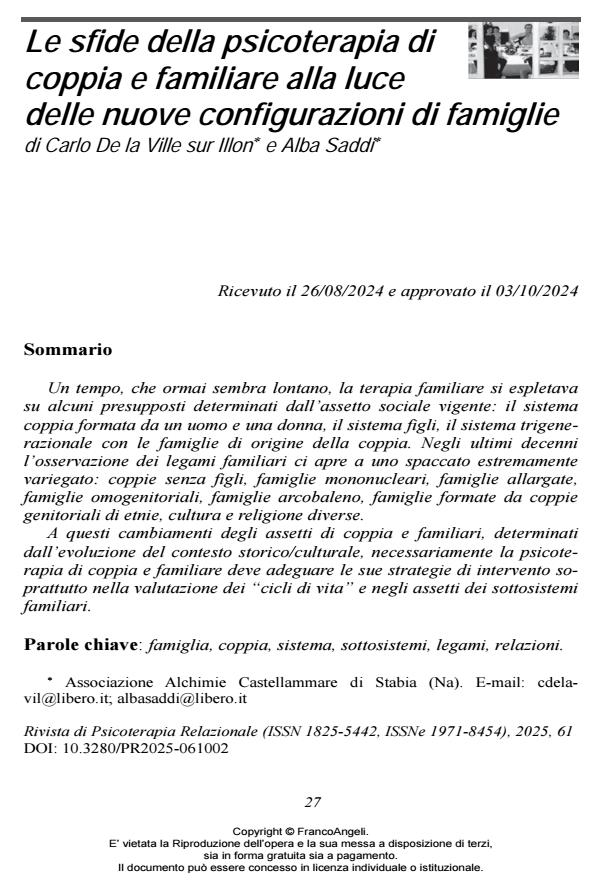Le sfide della psicoterapia di coppia e familiare alla luce delle nuove configurazioni di famiglie
Titolo Rivista RIVISTA DI PSICOTERAPIA RELAZIONALE
Autori/Curatori Carlo de la Ville sur Illon, Alba Saddi
Anno di pubblicazione 2025 Fascicolo 2025/61
Lingua Italiano Numero pagine 13 P. 27-39 Dimensione file 76 KB
DOI 10.3280/PR2025-061002
Il DOI è il codice a barre della proprietà intellettuale: per saperne di più
clicca qui
Qui sotto puoi vedere in anteprima la prima pagina di questo articolo.
Se questo articolo ti interessa, lo puoi acquistare (e scaricare in formato pdf) seguendo le facili indicazioni per acquistare il download credit. Acquista Download Credits per scaricare questo Articolo in formato PDF

FrancoAngeli è membro della Publishers International Linking Association, Inc (PILA)associazione indipendente e non profit per facilitare (attraverso i servizi tecnologici implementati da CrossRef.org) l’accesso degli studiosi ai contenuti digitali nelle pubblicazioni professionali e scientifiche
Un tempo, che ormai sembra lontano, la terapia familiare si espletava su alcuni presupposti determinati dall’assetto sociale vigente: il sistema coppia formata da un uomo e una donna, il sistema figli, il sistema trigenerazionale con le famiglie di origine della coppia. Negli ultimi decenni l’osservazione dei legami familiari ci apre a uno spaccato estremamente variegato: coppie senza figli, famiglie mononucleari, famiglie allargate, famiglie omogenitoriali, famiglie arcobaleno, famiglie formate da coppie genitoriali di etnie, cultura e religione diverse. A questi cambiamenti degli assetti di coppia e familiari, determinati dall’evoluzione del contesto storico/culturale, necessariamente la psicoterapia di coppia e familiare deve adeguare le sue strategie di intervento soprattutto nella valutazione dei “cicli di vita” e negli assetti dei sottosistemi familiari.
Parole chiave:famiglia, coppia, sistema, sottosistemi, legami, relazioni.
Carlo de la Ville sur Illon, Alba Saddi, Le sfide della psicoterapia di coppia e familiare alla luce delle nuove configurazioni di famiglie in "RIVISTA DI PSICOTERAPIA RELAZIONALE " 61/2025, pp 27-39, DOI: 10.3280/PR2025-061002